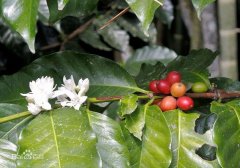Malaba coffee beans in the western coffee producing area of Rwanda
Malabar beans are hand-picked and sorted according to quality
Malabar beans are hand-picked and sorted according to quality
PEARL brought coffee specialists to Rwanda, where it was responsible for maintaining contact with the seller, Community Coffee of Louisiana, USA, and sending samples to Louisiana. In June 2002, representatives of Public Coffee visited Malabar. At that time, the current President of Rwanda, Paul Kagame, stated on behalf of the Government the importance of this programme. Public Coffee bought 18000 kilograms (40000 pounds) of maraba beans for $3 a kilogram, above the market average. Coffee beans are shipped to Louisiana, where they are roasted and used in the company's fine coffee. It was also the first direct contract between an American roasting company and an African coffee cooperative.
Comic relief, a british charity, has also taken an interest in malaba. They pledged to donate some of the £ 55m they earned in Britain and Africa from Red Nose Day in 2001 to the Association des Veuves du Genocide (AVEGA), an association for widows of the Rwandan genocide of 1994. The charity found that many Malabar smallholders were also AVEGA members and were therefore able to provide funding and assistance to Malabar farmers through AVEGA. They contacted Union Coffee Roasters, a British coffee roasting company, and in 2002 their representatives visited Malabar along with Fairtrade Labelling International (FLO) executives. After visiting various places, the group was awarded certificates, and Maraba coffee became the first commodity for which Rwandan cooperatives had won fair trade status. UCR described Maraba coffee as "sparkling citrus flavours with rich, sweet chocolate notes" and bought all the unsold products from the 2002 harvest.
In early 2003, UCR distributed Maraba coffee through Sainsbury's supermarket and sold it in 350 of its stores until Red Nose Day. In 2003, the Abawuzamgambi cooperative earned a net profit of $35000. Seventy per cent of that amount was distributed to farmers at a price of $0.75 per kilogram, more than three times the profits made by other Rwandan coffee growers and enough to cover previously unaffordable health care and education services. The remaining 30 percent is invested back in the cooperative and used to purchase calcium carbonate, an agricultural lime that reduces soil acidity caused by rainfall loss of minerals

Important Notice :
前街咖啡 FrontStreet Coffee has moved to new addredd:
FrontStreet Coffee Address: 315,Donghua East Road,GuangZhou
Tel:020 38364473
- Prev

Qidon Lulu Cooperative Manor Coffee beans Coffee training for High altitude Coffee beans
The Dunlulu Cooperative, founded in 1999 in Embu, Kenya, has 1200 active growers and the cleanest water treatment centers. It is well known that cooperatives pay producers far higher than government requirements. In Kenya, cooperatives have to pay 80 per cent of the final income to coffee farmers, and Kithungururu ends up paying 95 per cent more to coffee farmers than other cooperatives.
- Next

Treatment of washing coffee beans in Gethumbwini Estate manor in elevated bed to dry coffee beans
Gethumbwini Estate [coffee] Gethumbwini Estate AA [farmer]
Related
- Does Rose Summer choose Blue, Green or Red? Detailed explanation of Rose Summer Coffee plots and Classification in Panamanian Jade Manor
- What is the difference between the origin, producing area, processing plant, cooperative and manor of coffee beans?
- How fine does the espresso powder fit? how to grind the espresso?
- Sca coffee roasting degree color card coffee roasting degree 8 roasting color values what do you mean?
- The practice of lattes: how to make lattes at home
- Introduction to Indonesian Fine Coffee beans-- Java Coffee producing area of Indonesian Arabica Coffee
- How much will the flavor of light and medium roasted rose summer be expressed? What baking level is rose summer suitable for?
- Introduction to the characteristics of washing, sun-drying or wet-planing coffee commonly used in Mantenin, Indonesia
- Price characteristics of Arabica Coffee Bean Starbucks introduction to Manning Coffee Bean Taste producing area Variety Manor
- What is the authentic Yega flavor? What are the flavor characteristics of the really excellent Yejasuffi coffee beans?

